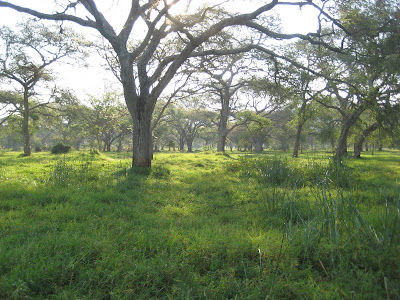We spent the morning visiting with Andy Hart in the village he works in outside of Iringa, called Ismani. A British veterinarian by training, he's been here in Tanzania for seven years, working on development projects in and around Ismani. When he first got here, he started by vaccinating chickens for Newcastle disease in the village, and using that as a way to meet and talk to people and figure out what some of the things are that they're doing well, and what needs they have that are unmet.
From talking with the people in Ismani, he learned that they had previously had a cattle dipping station set up, but that it needed renovation to continue working and generate revenue for the community. The villagers banded together to raise the money and supplies to fix up the dipping station, and put it into use. Dipping here in Tanzania is used to prevent tick-borne diseases, particularly East Coast Fever, which is endemic to Tanzania and can cause huge losses in the cattle herds. Now the dipping station is used by the surrounding seven villages for their cattle, and its run by a committee of farmers in Ismani who have used the profits to set up new projects in their village, including spring water development and the establishment of a veterinary drug store.
Andy also told us about other projects he's worked on in the seven years he's been here in Tanzania, and some of their successes and failures. He had great stories, and even better ideas, and was really an inspiring person to talk to. At the same time, its almost intimidating to meet someone who is so smart and creative in his approaches to solving problems in these villages--I remember reading Mountains Beyond Mountains and thinking the same thing about Paul Farmer and his healthcare work in Haiti. But, like Val is so fond of saying, when you're confronted with an impossible array of problems that must be solved, you find ways to solve them.
We returned to downtown Iringa along the bumpiest road I've ever taken, and stopped at a shop called Neema Cafe for lunch and a tour. Neema Crafts, the shop with the cafe in it, is a business that Andy's wife started in response to the problem of Tanzanian people with disabilities. Many of these people were out begging on the streets because they couldn't work due to their disabilities--whether caused by polio, cerebral palsy, or traffic accidents, the three biggest causes of debilitating injuries, and Neema employs these disabled people, and well as deaf people, to make all kinds of crafts to sell in the store. They have their workshop in the back of the shop, and we saw where they made ceramics and glass beads from recycled wine bottles. We watched one man make decorative paper from maize and recycled paper, and from elephant dung. There were women with babies in slings on their backs stringing beaded necklaces, paraplegics making scarves on hand looms, and deaf boys sewing clothes and pillow covers from locally made fabrics. Everyone spoke in sign language. It was an amazing combination of working on a social problem, while also being environmentally friendly and appealing to a tourist trade to remain economically viable. Amazing.
After buying some souvenir elephant dung paper and jewelry, we headed out to Kibebe farm, a large dairy operation owned by a British family. They had tons and tons of land, and a herd of about 450 cattle--Ayrshire for milking and Sussex for milk, meat, and working oxen. It was a beautiful farm, and definitely felt like a different world from the village we were in this morning.
Meing'Ataki told me that while in many African countries there are still lots of Europeans holding land, this farm is unusual in Tanzania since the government repossessed all the land after they gained freedom in the 1960s. Most of the Europeans in Tanzania at that time were left landless, but the family that owned Kibebe farm was able to sign a 99 year lease on their land and remain there. The operation was very successful--there was no mastitis, all the cows were milked by hand, and they were the cleanest cows I've ever seen. Becaues foot-and-mouth disease is endemic in Tanzania, they can't really avoid it, and simply quarantine cattle that get it and wait for it to run its course. With all the fear of FMD in the states, I would have thought that it was much more dangerous, but none of the farmers--whether Kibebe or villager--cull infected cows. I suppose in an endemic area there wouldn't be much to gain from that practice.
Around sunset, we drove back to Riverside for dinner. I was exhausted from all the traveling, and went straight to bed after our dinner and post-dinner lecture.
Subscribe to:
Post Comments (Atom)






No comments:
Post a Comment